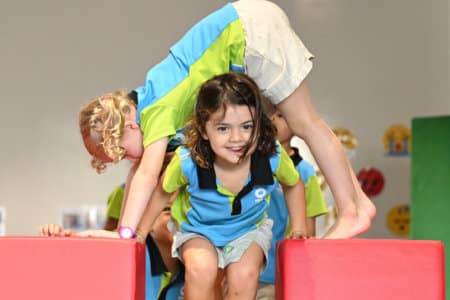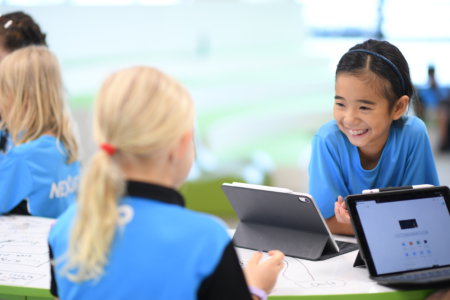Going outside can do wonders for any child’s physical and mental health. You don’t need to look far for studies and research that confirm the benefits of these experiences: children learn faster, remember more, and can easily apply their knowledge to everyday situations.
These are descriptions fitting of Nexus International School (Singapore) learners. At Nexus, students are “learners” – reflecting its core purpose that we are all here to learn and that learners are encouraged to take ownership of their learning journey. True to the award-winning school’s guiding philosophy — i.e. The Nexus Way — the school has transformed the outdoors into a space where learners are free to play, explore, and flourish.
“Our activities and programmes encourage learners to step out of their comfort zone, develop new areas of interest and give them opportunities to follow their passions,” says Andy Jefferson, an Education Outside the Classroom (EOTC) Coordinator.
From the youngest to the oldest, all Nexus learners have a wide range of opportunities that let them learn beyond the classroom. Authentic and engaging, these experiences take place in various areas within and outside their campus, and even on excursions abroad at countries like Cambodia and Switzerland. Early Years learners have engaging learning spaces, including pods for collaborative play and an outdoor area featuring a garden, a sand pit, and water play areas. Learners attend weekly swimming and PHE lessons, with many representing the school in sports teams, including football, athletics, netball, basketball, rugby and swimming. Secondary learners also attend overseas trips for community service projects and fieldwork.
Teachers suggest and plan h new activities too – and often go above and beyond to make them as impactful as possible. When the Head of Early Years saw that learners were interested in the growth cycle of plants, she set out to install a hydroponic garden in their space. Not only did she satisfy their intellectual curiosities, but she also made sure these young learners can view the plant cycle in real time while learning about hydroponics and how to harvest vegetables.
It’s crucial for children to have such experiences that get them to move more, go outside and do more for the world. Access to green spaces has been linked to a child’s well-being, increasing their prosocial behaviour, research has shown. There’s a growing body of evidence that shows excessive sitting is linked to various health risks. Light activity led to better mental health as children grow older. Volunteering through school is associated with better overall health and wellness among children and adolescents, another research found.

Every child at Nexus is capable of taking on a leadership role and co-curricular activities are one way to facilitate that. Source: Nexus International School (Singapore)
Diverse co-curricular opportunities
With approximately 100 activities, the co-curricular activities (CCA) programme lets all Nexus learners discover new interests, hobbies, and passions. From choir to Model United Nations, there’s a range of exciting exposure for every child at Nexus.
One stand-out feature of these CCAs is that they encourage learners to take on a leadership role and facilitate many initiatives. Past projects saw some working on their vertical garden — ranging from prototypes to a two-metre-high garden — and creating a skate park. Others led a variety of outdoor adventures, including rock climbing, chess, Rubik’s Cube, Coding for Girls, and Learning to Skateboard.
Older learners are encouraged to lead a CCA as part of their creativity, activity, and service (CAS) component for their IB Diploma or as a contribution towards their Duke of Edinburgh Award. “We hope this learning journey in Singapore helps to not just create participants but also future leaders,” says Jefferson.
The list of CCAs is not exhaustive. Nexus faculty can work with learners to create new ones, which is exactly what happened when a team of three decided they wanted to join the prestigious World Scholars Cup competition at a global level.
“The curriculum for The World Scholars Cup is very challenging and different from what they do in the classroom,” says Deputy Head of School (Secondary) Duncan Shiel. “We created an extracurricular activity that allowed them to collaborate across year groups to study the material and develop skills such as debate and leadership qualities.”
When they returned from the finals at Yale University, the group of three didn’t count medals — they cherished the journey that spurred them to learn and lead better. Now, they’re looking at running the CCA as a way to help others at Nexus who are interested in joining the competition.

School field trips at Nexus provide alternative educational opportunities, cultural enrichment and community service. Source: Nexus International School (Singapore)
Nurturing global citizens
Local and overseas school trips help learners become aware of their place in the world and their responsibilities as global citizens. And this starts as early as Year 1.
Previous Year 1 cohorts have visited the Botanic Gardens as part of their unit of inquiry on “Choices and Wellbeing,” where they worked with the school’s trips team to plan the itinerary. Year Eight learners went on a four-night residential trip to Telunas, Indonesia. Through a community project, they visited a local village where they assisted on small construction projects and learned how to use local resources and techniques, took part in jungle hiking, jetty jumping, and fishing, among others. In between, they bonded and reflected on how they’ve grown over the five days of activities. Year 12 learners journeyed to Cambodia as part of their International Baccalaureate’s Creativity, Activity, Service curriculum. Taking on a community project, these learners visit and connect with a local village. Last year’s learners built an extension to the school library, extended the concrete area of the basketball court, and painted the playground equipment to create a vibrant environment for the children. They also ran small group sessions on oral hygiene, distributing donated toothbrushes and toothpaste.
The school also organises cross-year trips to Europe that are just as enlightening too. The London Arts trip immerses learners in one of the world’s most vibrant theatre scenes, helping them shape a discerning eye for acting techniques, stagecraft, set design, and costume creation. The ski trip to Verbier, Switzerland sharpened their skiing and snowboarding skills over the course of one week.
“Our first overnight trip starts with Year Three,” says Stephanie Hughes, Deputy Head of School (Secondary) and a former EOTC Coordinator. “The trips then progress through the years so that the skills learned from one trip are built upon in future trips.”
Learners are involved in the process of planning these trips. At the Nursery level, they can work with the teachers to plan what to pack. “Year 13s, meanwhile, are given a destination and asked to design the trip themselves! They choose the activities they want to do and the causes they’d like to support,” Hughes shares.
Follow Nexus International School (Singapore) on Facebook, LinkedIn, and Instagram.













